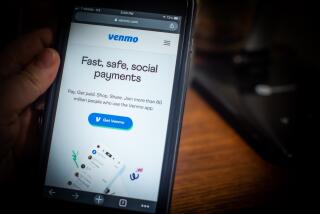Quake Preparedness Includes Stashing Cash
- Share via
SANTA BARBARA — Consumers and merchants will have to rely on cash or trust if a great earthquake shatters the web of computers and commerce that permit checking, credit cards and automated tellers, financial experts say.
For people without enough cash on hand, “There will be a lot of good-faith business going on” until damaged banks can reopen, said Monroe Morgan, senior vice president of Great Western Financial Corp.
“Cash will be the medium of exchange during the restoration period,” said David Harris, vice president of First Interstate Services Co., the data processing subsidiary of First Interstate Bancorp.
Governor’s Committee
Harris and Morgan, members of the monetary systems committee of the Governor’s Earthquake Preparedness Task Force, spoke Friday at the annual conference of the Southern California Emergency Services Assn.
They outlined what may happen to financial institutions and their customers in the days after a quake measuring 8.3 on the Richter scale. Geologists expect such a temblor in Southern California within 30 to 50 years, resulting in up to 30,000 deaths.
Quake damage and power outages will likely shut down bank communication and computer systems for days, halting the processing of checks, destroying records of some transactions and leaving merchants unable to get authorization for credit card purchases, Harris and Morgan said.
People “will be clamoring for cash and won’t be able to get it out of automated teller machines,” and may be allowed to make only limited withdrawals once banks reopen, Harris said.
Loss of Homes, Cars
They “will be concerned they’ll lose their homes and cars and have their salaries attached” because loan payments will get lost after a big quake, Morgan said. Owners of damaged or wrecked homes who failed to buy quake insurance also would fear foreclosure, he added.
But most financial institutions will be tolerant of payment delays and “would work with people to try to provide some form of reasonable financing to rebuild houses rather than foreclose and own a bunch of damaged houses or vacant lots,” he said.
Major banks, backed by the Federal Reserve, have plans for sending cash for reconstruction into quake-stricken communities and for replacing damaged branch offices with temporary offices in mobile homes, he added.
More to Read
Sign up for Essential California
The most important California stories and recommendations in your inbox every morning.
You may occasionally receive promotional content from the Los Angeles Times.













